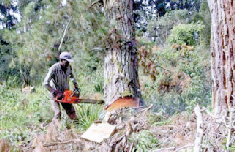Timber industry left high and dry after logging ban

Until five years ago, Rai Plywoods Kenya Ltd was thriving, employing more than 3,000 workers.
However, the giant company based in Eldoret, Uasin Gishu is now a shell of its former self and can only employ a paltry 300 workers with many rendered jobless.
People Daily has established that employees have been working in deplorable conditions with many forced to work without personal protective equipment such as masks and overalls.
It also emerged that the company has, for the last 10 years, retrenched thousands of its staff owing to the lack of raw material.
“We have not had any protective devices as we work around the machines. The situation is worsening by the day. Many of us cannot cater for our families including school fees for our children,” said a worker who sought anonymity.
The situation has been aggravated by moratorium that the government imposed on logging of forest products in 2018, which led to a 92 per cent drop in total sale of timber to 10,700 true cubic metres from 144,200 true cubic metres a year earlier.
Total area under Government forest plantation increased from 141,000 hectares in 2018 to 147,000 hectares in 2019.
Rai Plywoods was among companies worst hit by the ban that negatively affected its operations due to lack of raw materials with most of its customers now preferring imported cheap timber products, especially from China.
Efforts to get a comment from the company management yesterday proved futile as journalists were denied entry.
The Rai Plywoods was the leading manufacturer and supplier of Veneer and Ordinary, Plywood, Clipboards, Doors, Block boards, Ceiling boards, Melamine boards, Parquet flooring, furniture and Polypropylene woven bags. Workers in timber milling industries have since appealed to the government to reconsider the ban on logging in public forests.
Many timber industries in the Western region have written to workers’ unions about their intention to lay off.
“Many employers will face difficulties in paying terminal dues for affected workers as they are facing financial constraints due to the ban. Some workers have worked for these companies for over 20 years,” said Christopher Mukeya, a timber workers union official.
According to Mukeya, Saccos and banks have put many workers on notice because of their unpaid facilities that have started attracting penalties.
People Daily established that many timber industries in the North Rift depend on public forests like Kaptagat and Timboroa to source their raw materials.
Workers are now appealing to the government to lift the ban and involve employees in timber industry in replanting trees where some have been cut.
Simplest form
Timber Manufacturers Association (TMA) has acknowledged that the logging ban has thrown the industry into disarray with hundreds set to be rendered jobless.
TMA says the industry is the simplest form of industries providing informal and formal employment to thousands of people in rural areas.
“The ban has caused unemployment, thereby affecting the livelihoods of hundreds of Kenyans,” TMA said in a statement.
Association has estimated that one million Kenyans employed directly or indirectly by the industry have been rendered jobless following the logging ban.
Saw millers have maintained they strictly operate under the law, and dismissed claims that they were behind wanton destruction of water towers.
“Before our members can engage in any form of harvesting, they have to be prequalified by the authorised agency through a comprehensive evaluation of vetting process,” TMA said.
Association added that felling of trees is guided by the Forest Plantation Management Plan is provided for each Forest Station.











